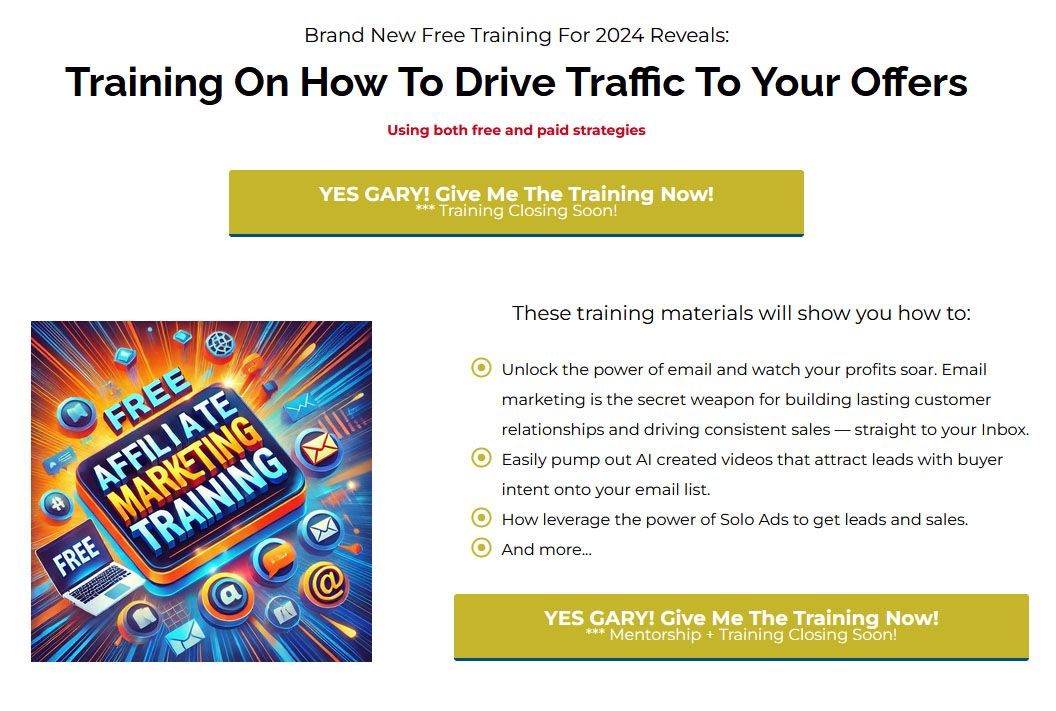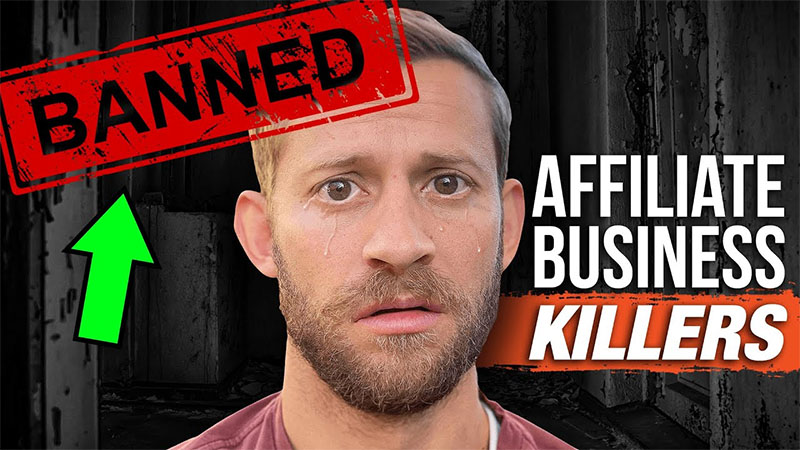With the way things are going in the world today, with real incomes declining, inflation rising and your purchasing power dropping, you may be looking for a way to supplement or even replace your income.
Affiliate marketing is a route many have taken either because of those reasons or because they want greater control over their lives and how they use their allotted time on this planet.
One of the things I recommend that anyone interested in becoming an affiliate marketer does is to find a quality mentor.
It make the whole process much more simple and you’ll avoid many of the common pitfalls.
Spencer Mecham is one of my three mentors and in this video he describes how to set up a system to start building an email list and getting sales and how to promote that system for free:
If you’d like to learn more from Spencer, he has a number of free courses. (unfortunately, Spencer seems to have retired from affiliate marketing and only an old copy of his Clickfunnels course is now available online):
Affiliate Marketing 101Email Marketing CourseCopywriting Secrets Course- Clickfunnels A-Z Course
He also had a full, comprehensive paid course that covered all aspects of affiliate marketing and how to drive traffic to your promotions and offers, but that too is no longer available.
Here are the current alternatives I now highly recommend for affiliate marketing training:
- AI Cash Machines - a one-time $27 course that's worth $2,000. It teaches you affiliate marketing strategies that work in 2025 and beyond and shows you how to leverage the power of AI for automation and efficiency. There's also a free-to-join private Skool Group where the course creator provides training to members.
- Easy Commission Funnel (ECF) - this is 100% FREE. It's a sales funnel in a box that now promotes over 10 programs that can build you a passive income. training is included, but it's mostly about how to set things up and how to drive traffic. Nowhere near as detailed as the training in AI Cash Machines but the ECF will get you started for zero up-front cost.

All the best,
Gary Nugent
Check out my Instagram posts and reels here:
Follow me (@aiaffiliatesecrets) on Instagram
P.S.: Don't forget, if you want to create an internet income of your own, here's one of my recommended ways to do that:






Hi Gary,
Getting a mentor is a great idea, but aren’t they expensive? Does Spencer Meecham also offer free mentoring as a temporary tryout or do his free courses already include some mentoring?
Between Zach Crawford and Spencer Meecham, which one of them do you recommend the most for an absolute beginner?
Hi Christine, great questions.
Quality mentors are relatively expensive. But you ‘ve got to look at that expense as both an investment in your own education and an investment in your online business.
People always pay to get the best education they can afford – look at the costs of private schools or the costs of going to University.
The latter will probably put you in debt for a lot of your life, especially if you’re in the USA. Europeans are a bit more egalitarian where third-level education is concerned, but it’s seldom free.
We all know that there’s plenty of free “how to make money online” videos on YouTube but how do you know if the presenter makes any real money themselves?
And what qualifies them to be teachers at all, let alone good ones?
You usually get what you pay for and “free” generally doesn’t deliver the results you want.
Free training also comes in bits and pieces – there’s no overall framework for how those pieces fit together and the best order in which to do things.
And many video creators won’t (or can’t) provide quality and knowledgeable support.
Why should they? Anyone looking for support on YouTube is just wasting the video creators time since they’re not being charged for it.
Would you trust someone to diagnose what’s wrong with you if you found out that they’d “learned” how to become a doctor, dentist or surgeon just by watching free YouTube videos? 🙂
So why should learning business skills be any different?
People who are willing to spend money on their education are motivated to do the work they’re tasked with. They have skin in the game.
People who only want freebies will never commit to any one type of business, strategy or methodology. They’ll always be chasing after that one elusive free key to online wealth.
So, with all that out of the way 🙂 , Spencer does have a free Facebook Group that he posts to fairly regularly.
To be honest, I don’t know if he provides mentoring within the group. Since I’m one of his students, I get access to his private Facebook Group where the real mentoring happens and he’s in there every day answering queries.
Take a look at his free video courses to get an idea of his personality, teaching style and level of knowledge to see if he’s someone you could work with.
Not all mentors suit all potential students no matter how good they are.
You can also check out some additional free training Spencer has (and continues) to put out on YouTube here.
It’s a long time since I took his free courses but I think you can ask questions in a section below the videos.
But bear in mind that his and any mentor’s main focus will be on helping their paying students.
Spencer’s course is less expensive than Zach’s but it doesn’t have the depth that Zach’s does.
Zach now has a couple of new teachers on staff (students of his) who are more knowledgeable in certain areas like Facebook marketing than he is.
He intends to bring in additional experts in different fields of marketing as time goes by.
Zach’s course goes much more in depth into mindset and how important it is for success (there’s no woo-woo nonsense).
And his course goes into the why’s of how you should do things when building your online business.
Both courses teach you how to become an affiliate marketer and how to apply the skills you learn to various products.
Mentors like Anthony Morrison (Partner With Anthony) and David Sharpe (Legendary Marketer) teach you how to build a business selling their products only.
Some of those skills can be applied to other products but their focus is on you helping to build their business and getting rewarded in return.
Both Anthony’s and David’s courses have very low-cost entry points ($7/mth) but you’re encouraged to buy higher-level training and more and more products over time, so you end up putting more and more money into them.
That said, they are both excellent courses.
Spencer and Zach don’t take that approach. You only pay once for their courses and you get upgrades for free.
So, while the up-front costs are a lot higher, over time they can work out less expensive than courses like Partner With Anthony or Legendary Marketer.
I am a Partner With Anthony member myself but not a Legendary Marketer member as what those two courses teach is very similar, so there was no need to subscribe to both.
Both Spencer’s and Zach’s courses are suitable for beginners.
However, it will take you longer to go through Zach’s course as he goes into real detail about why you should structure a business as he teaches.
If you’re looking to get results faster, then Spencer’s course is the better option.
I originally bought Zach’s Top Earner Mentor course back in 2019. He’s since released his new course and all his Top Earner Mentor students were grandfathered into the new course.
Last year (2021) I bought Spencer’s updated course and it’s really excellent.
But I find myself continuously returning to Zach’s course for its more meaty content.
You can always take a look at Spencer’s free webinar about his course that’s available on my bonus page for that course.
If you want to get a taste of Zach’s personality and teaching style, sign up for his free training here.
Or join his free Facebook Group (he does provide some mentoring here).
Zach also endorses Anthony Morrison as a mentor and if you want some free training on how to make the most of Anthony’s program, sign up here.
I don’t know if I’ve helped answer your questions or confused you further, Christine! 🙂
But, if budget or wanting faster results is a factor, go for Spencer’s course.
If you want more depth and the reasoning behind why things should be done a certain way, then Zach’s course is the better option.
If I haven’t answered adequately or you have other questions, please get back to me.
All the best,
Gary
Getting a mentor is a great idea especially if you’re a beginner. I took a look at Spencer’s video and like his style of teaching. However, I wouldn’t choose to buy a course at this time. Email marketing is certainly an important part of making money online and i’ve already been putting into action some of the things he talks about. Courses can be invaluable though and I have invested in a couple in recent times including SEO for Pinterest. Thanks for sharing
Hi Kathy,
I’d have to say that getting a mentor is a great idea. Period. Whatever level you’re at, there’s always someone who knows more than you do.
A few years ago I found that I’d plateaued in my earnings. Nothing I tried got me any extra income. And I’d been an affiliate marketer almost as long as I was a professional programmer/software engineer/consultant. So I didn’t consider myself a newbie.
I finally had to admit that I needed help and couldn’t do it all on my own, no matter how hard I tried.
That’s when I started looking around for a mentor and two names stood out to me because of knowledge, personality and teaching style – Spencer Mecham and Zach Crawford.
I ended up buying both their courses and refer back to each of them regularly.
Another mentor was recommended to me – I won’t mention his name – and I bought his course on that recommendation. It wasn’t a high-priced course so it didn’t put much of a dent in my pocket.
But I made the mistake of not taking a look at some free videos with the guy. It felt like, in his course, he was bouncing off the walls with hyper and histrionic energy. Every few sentences he’d punch the air and shout “boom” as he delivered some perceived golden nugget of information.
That style of presentation can go down well with Americans but we Europeans prefer a more controlled and measured teaching style. I couldn’t stand the guy and couldn’t watch his videos as a result. So he lost a student and potential future revenue and I lost some money.
Spencer and Zach don’t need to get excitable to keep their students’ attention (or drive them away). They genuinely know their stuff, have likeable personalities and are good teachers.
The same could be said for many other mentors too.
The point is to research a potential mentor and see if they’re someone you could work with or not.
Courses are an investment in your own education and in your business. Too many people see them as an expense instead.
Budget is obviously a consideration but you should try to get the best mentor you can afford. Skimping here might mean less up-front costs but a long-term reduction in potential future income.
I neglected email marketing for years. It was too hard and too complicated but these days the tools available make the process of list building much easier.
There’s still the problem of where to get quality traffic though. That’s the perennial issue for webmasters and list builders.
And it doesn’t matter how goo d your skills are at building websites, landing pages and sales funnels.
If you can’t get the traffic and, especially, the right kind of traffic to those assets, no business will thrive online.
I wish you well on your own affiliate marketing journey 🙂
All the best,
Gary
Great answer! That helps a lot. Thank you!
Hi Gary – I’ve been looking for tips on how to make some additional money online and found this article to be helpful. Like the reasons you mentioned above, with prices on everything going up, now is a great time to try and find some supplemental income. I like the idea of finding a mentor to help guide you with this type of journey but with so many people out there offering courses (free and paid) what are things that you look for when determining if someone is truly genuine in their mentorship? Thank you for sharing your knowledge on this subject!
Hi Dereck, thanks for your comment. The first thing to look for with any potential mentor is how they engage with their students. The good ones will have Facebook groups, or maybe Telegram or Discord groups that are free to join.
You can gauge what people think of their mentor by how they respond to questions – are they helpful or rude? Do they ignore certain questions or take a long time in general to answer questions? What’s their level of knowledge (despite what they might advertise on their sales or optin pages).
The good mentors genuinely care about their students and will go out of their way to help their students in any way they can. They will expect you to do the work asked of you and for you to have some self-motivation and self-reliance.
They love when their students achieve success, even if that success eclipses what they have done themselves. They’ll probably even interview that successful student to get their thoughts on why they achieved their success. Good mentors know they don’t know everything and that they can learn from their students as well. They don’t have big egos and don’t speak to you from “on high”.
Many so-called gurus or mentors don’t have this mindset. They might have found a trick or strategy that works. If it’s a short-lived one, they’ll try to capitalise on that by rushing out some half-assed course, sometimes even after their strategy is winding down or has stopped working.
Others are only interested in your money and once you’ve handed that over for their course, you’re left high and dry when you have questions. There’s no community or community-spirit. You can’t even engage with other students because those “gurus” are afraid that bad word-of-mouth will spread about how much their course sucks or how bad they are as mentors.
Good mentors encourage their students to ask questions. There’s no such thing as a dumb question. The only bad question is the one not asked. They recognise that their students come from all levels of experience and knowledge and that what’s obvious to one student isn’t to another. And that there are other students hiding in the wings too afraid to ask that exact same question.
Good mentors are not afraid to let their students talk to each other and help each other. They want to know if their course is deficient or not clear enough in some areas so that they can fix or improve the course. They ask for feedback, good and bad. They’re not scared of being seen as not knowing everything. Nobody does. Internet/affiliate marketing is too broad a thing for someone to know everything about it. So people tend to specialise.
One mentor is good at general principles of affiliate marketing and marketing in general whereas another might be an expert in advertising offers on YouTube, another a Facebook expert and so on.
You will likely need several mentors but not all at the same time. Pick one and stick with what they teach until you’ve mastered that. Only at that point should you seek out another mentor that can teach you additional skills you may need to expand your business.
Quality mentors do not provide their best training for free. Some people have the mindset that if something is on the internet, then it should be free. Think of any internet marketing course as being like a college/university course. In most countries, people have to pay for a third-level education. It’s the same with internet/affiliate marketing.
If you want the best mentors, you going to have to pay for access to them. But the fees are a tiny fraction of what you’d pay for a College/University education.
Another reason that mentors charge fees is that they know that if someone is financially invested in their course, then they’re going to want to get value from what they bought and so are much more likely to follow the course and do the work.
If you pay a few bucks for a course, you’re not that invested in it and if you do nothing with it, then you don’t care if it gathers digital dust on your hard drive.
The best mentors charge you once for their course. Upgrades and additions to the course are free and them selling their course is not their primary income source.
Some mentors do use a scaling system where you buy a basic course for a low cost and then find that you need to pay for additional tools and course upgrades as you increase your knowledge.
This can be a good way to get started in affiliate marketing if you’re not certain it will actually be something you’ll keep doing or if your budget is small. But, over time, the fees will increase the more you get invested in that course.
Check out my How Do You Find a Good Affiliate Marketing Mentor? post for some mentors to take a look at and some other guidelines to use in choosing a mentor.
Hope that helps.
All the best,
Gary